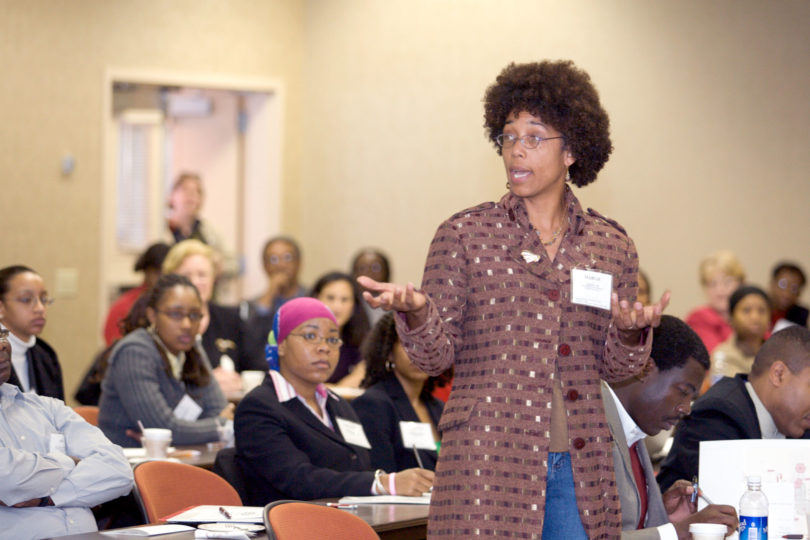“We have a space, but do we have a place at the University of Georgia or in higher education to tell our African-American stories, and know that they are both affirmed and evaluated without judgment, a place of support?” asked Talmadge Guy in closing UGA’s inaugural Conference on Black Issues in Higher Education.
“Today, this conference has brought us together, and together we make a place,” he said.
A diverse audience of nearly 100 UGA faculty and graduate students attended the Feb. 3 conference, which illustrated that the plight for equality in higher education here and across the country is far from over.
“Education is the oldest form of combating racism,” said Norvella Carter, the endowed chair of urban education at Texas A&M University and one of two keynote speakers, “but there is still an unequal balance of blacks in higher education, whether you’re talking about faculty or students.”
In many Research I universities, black faculty account for just 1 percent of total faculty and only a small number of that 1 percent are tenured, full professors, according to Carter. In fall 2005, 6 percent of UGA’s faculty were African American, and 4 percent were full professors, according to the 2005 UGA Fact Book.
Over the past several years, the university has worked to increase black enrollment, and the numbers are slowly improving. In 2005, UGA offered admission to 570 African Americans for the fall freshman class, a 36 percent increase over the previous year. However, black enrollment still represents a small percentage of the 33,000 students who attend UGA each year.
The inaugural BIHE conference was initiated by faculty members in UGA’s College of Education, which has been a campus leader on issues of diversity. In fact, black faculty account for 17.9 percent of full-time faculty in the COE. Further, nearly half of COE black faculty are tenured and hold the rank of full or associate professor.
“Given the demographics of our state and our campus, it is important that we have this focus and this conversation,” said Juanita Johnson-Bailey, professor and graduate coordinator of adult education and women’s studies, and co-planner of the conference.
Between keynote speakers, nine UGA faculty members from disciplines across campus served on panel discussions, sharing stories on obstacles they faced in higher education and addressing participants’ questions and concerns. Among the issues discussed were low enrollment of black students at land-grant institutions, under-representation of black faculty and retention of black faculty.
Bettye Smith, an associate professor in the department of workforce education, leadership and social foundations and co-planner of the conference, said she hoped the critical mass of black faculty at the conference will spawn conversations about African Americans’ uniqueness and circumstances on UGA’s campus and in academia.
“We want to be deliberate in our intention to build a community of mentors for our junior faculty and graduate students,” said Smith. “Our panels and guest speakers addressed such issues such as, ‘How do you build a research agenda? How do you get published?’ and ‘How do you find a mentor?'”








